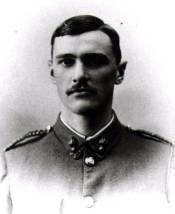George Findlay facts for kids
Quick facts for kids
George Findlay
|
|
|---|---|
 |
|
| Born | 20 August 1889 Balloch, Dunbartonshire, Scotland |
| Died | 26 June 1967 (aged 77) Helensburgh, Dunbartonshire, Scotland |
| Buried |
Kilmaranock Churchyard, near Gartocharn
|
| Allegiance | |
| Service/ |
|
| Rank | Colonel |
| Unit | Royal Engineers |
| Battles/wars | World War I World War II |
| Awards | Victoria Cross Military Cross and Bar |
| Other work | Deputy Lieutenant |
Colonel George de Cardonnel Elmsall Findlay (born August 20, 1889 – died June 26, 1967) was a very brave Scottish soldier. He received the Victoria Cross (VC) and the Military Cross (MC & Bar). The Victoria Cross is the highest award for courage given to soldiers in Britain and the Commonwealth. It is given for amazing bravery when facing the enemy.
Findlay joined the Royal Engineers in January 1910. He earned his first award, the Military Cross, for his bravery during the Battle of Passchendale. After this, in June 1917, he took charge of the 409 (Lowland) Field Company.
Contents
Heroic Actions in World War I
George Findlay was 29 years old during the First World War. He was an acting major in the 409 (Lowland) Field Company, part of the Corps of Royal Engineers. He showed incredible bravery during the second battle of Sambre in France. This is why he was awarded the Victoria Cross.
Building a Bridge Under Fire
On November 4, 1918, Major Findlay was with the first groups trying to cross the Sambre-Oise Canal. They were at a lock south of Catillon, France. Suddenly, they came under very heavy enemy fire, and their advance stopped.
Even though the bullets were flying, Major Findlay quickly gathered his men. He worked to repair a bridge that would let them cross. The enemy kept firing, but he kept going. He was even wounded, but he did not stop.
After two tries, he finally managed to put the bridge in place across the lock. He was the very first person to cross it! He stayed in this dangerous spot until all the work was finished. His family tells a story that he crossed safely because he was a slow runner. The Germans shot ahead of him, thinking he would run faster, and so they missed him.
Life and Legacy
George Findlay went to St Ninian's Prep School in Moffat and then to Harrow School.
He continued his military career and later became a colonel. He also served in World War II. In 1957, he became a Deputy Lieutenant for the County of Dumbarton. This is a special role helping the King's or Queen's representative in the area.
George Findlay is buried in his family plot at Kilmaronock Church, near Gartocharn, West Dunbartonshire, Scotland.
Where to See His Medal
His Victoria Cross medal is on display at the Royal Engineers Museum in Chatham, Kent.
 | Janet Taylor Pickett |
 | Synthia Saint James |
 | Howardena Pindell |
 | Faith Ringgold |

